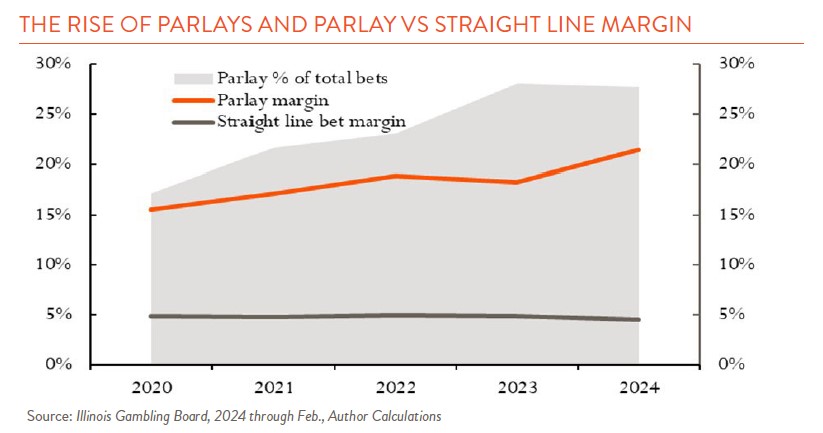With the recent conclusion of March Madness and its associated bracket pools, many Americans will not place another sports bet until the Super Bowl next year. However, since the 2018 Supreme Court decision, legalized sports betting has expanded to 38 states (and D.C.), including Vermont, this year. This tremendous geographic expansion has made it easier than ever for sports fans to bet on the games they are watching.
The rise of betting apps has not only expanded the reach and prevalence of sports betting but also the kind of bets, including parlays and proposition bets. A parlay bet is a series of two or more bets on one or more events, all of which must be won for a payout. For example, the Red Sox will beat the Orioles, Mookie Betts will have over 2 hits, and Tottenham will win outright over Newcastle. The payout if everything goes right can be huge, which is why many bettors prefer a parlay to a straight bet. But the house still makes sure that the odds are in their favor. In fact, sports books often add an “odds boost” to induce more action, and just like the casinos in Vegas, they are not doing so out of the kindness of their hearts but due to the much higher potential profit.
Data from the Illinois Gambling Board illuminates the difference, with parlays offering around 4 times more profit on average than straight line (bets on the outcome of the game) as shown in the figure below. Famed short-seller Jim Chanos publicly reversed his short stance on the industry in December, saying he, “underestimated…what bad bettors the U.S. gamblers are,” due largely to parlays.

Along with parlays, proposition, or prop bets, have also gained in popularity. Props are bets on outcomes that don’t directly relate to the outcome of the game. Examples include a specific player scoring a touchdown or making more than five three-pointers in a half. Prop bets have introduced new issues around both the integrity of games and the safety of players. In the last year, there have been a number of suspected wrongdoings, including an ongoing investigation into an NBA player for possibly helping associates win their prop bets. Gamblers have also been vocally blaming and abusing players for their lost prop wagers both in person and online via social media.
More broadly, the rise of sports betting has meant more scandals and more of gambling’s associated issues including addiction and monetary losses. Sadly, the number of calls to gambling addiction hotlines doubled in many states in the years after legalization. For example, in Ohio in 2023, the first year of legal sporting betting, calls to the gambling hotline increased by 55% and sports betting overtook lottery and casino slot machines to become the top form of problematic gambling. State governments have to contend with the tradeoffs between these problems and the associated tax revenue generated from gambling.
As for the sports leagues, they seemingly have no trouble accepting the money. Despite historically ostracizing gambling, leagues have wholeheartedly embraced sports betting firms as a source of licensing and advertising revenue, and even as partners in the betting platforms. The ads are now everywhere. A recent study found that NBA and NHL fans see three gambling ads per minute on a TV broadcast due to the actual ads as well as the large number of logos!
From the leagues’ perspective, growth in sports betting not only generates revenue but could also help to keep eyeballs on games. In our increasingly fragmented media environment, sports are competing for time—not only against other televised programming, but also video games, social media, streaming services, and even that old school notion of simply getting outside and maybe playing a sport.